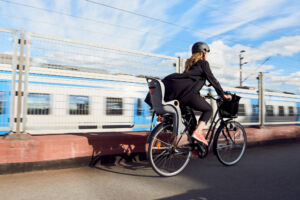For the mobility transition to succeed, it takes more than just alternative offers. It is equally important to change those practices that imply fossil-based mobility. Now, the question is how this can be achieved? In the project at hand, the communication and participation agency Lots* is working with experts from science and practice to investigate the effect of communication. The result should be a scientifically sound framework for a communication approach that can bring about a sustainable change in mobility behavior.
Research approach
Experiences from a wide range of practical areas and scientific approaches with regard to changing mobility behavior point out a gap: Despite various available research results, it remains unclear how changes can be achieved in a reliable way. In order to attain progress in this regard, the project has set itself the goal to combine approaches from communication science, environmental psychology and mobility research. During four project phases, practical partners will thus be included with the aim to try out proposals from the scientific realm, supplement them with practical knowledge and provide comments. ISOE contributes to the Mobility Expert Hub its broad expertise regarding the mobility culture approach, mobility practices and real-world experiments.
Background
Climate change poses an enormous challenge for society. In order to achieve the goals of the Climate Protection Act i.e. a 65 percent reduction in emissions in Germany by 2030 (compared to 1990), a change in the current fossil-based mobility is necessary. In Germany, less than six years remain to achieve this goal. Subsequently, the following questions need to be dealt with: How can we design a process that encourages people to switch from cars to more environmentally friendly means of transport? What do people need in order for a long-term change of (mobility) behavior to take place? And how can communication support this process?
Research and practice partners
- Prof. Dr. Katharina Klug, Professor of Business Psychology, Hochschule Ansbach (University of Applied Sciences)
- Prof. Dr. Sebastian Bamberg, environmental and social psychologist, University of Applied Sciences and Art Bielefeld
- Prof. Dr.-Ing. André Bruns, Professor of Mobility Management and Transport Planning, Hochschule RheinMain (University of Applied Sciences)
- Dr. Jutta Deffner, Head of the Sustainable Society Research Field, Focus: Mobility, ISOE – Institute for Social Ecological Research
- 20blue
- City of Aachen, Bayrisches Staatsministerium für Wohnen, Bau und, Verkehr (Bavarian State Ministry of Housing, Construction and Transportation), DB Regio AG, Deutsches Zentrum für Luft- und Raumfahrt (DLR), Dresdner Verkehrsbetriebe AG (DVB), experience, City of Leipzig and Leipziger Verkehrsbetriebe, City of Munich, nextbike, pb consult, Universität St. Gallen, Verkehrsverbund Rhein Sieg (VRS), Verband Deutscher Verkehrsunternehmen (VDV), Wiener Linien, Verkehrsbetriebe Zürich (VBZ) – Züri Linie, Verkehrsverbund Rhein-Ruhr (VRR)
Client
LOTS*, Leipzig
Contact:


